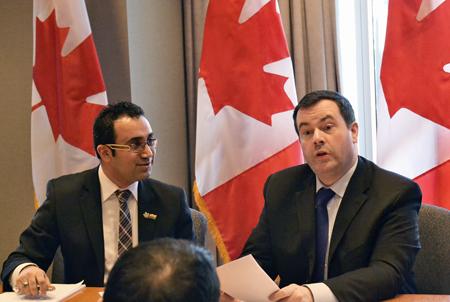Citizenship and Immigration Minister Jason Kenney says Canada’s doors are open for queer refugees seeking asylum from countries that are hostile to queer rights, but the reality is that it’s very difficult for the majority of the most desperate queer refugees to reach Canada.
While Kenney trumpeted the success the government has had in cooperation with the organization Iranian Railroad for Queer Refugees (IRQR), he was also announcing immigration reforms that some say could make it more difficult for queer refugees to claim asylum in Canada.
In order for a person to make an asylum claim in Canada, they must first either land in Canada or flee their home country to another country where they make a claim at the local office of the United Nations High Commissioner for Refugees (UNHCR).
Many queer Iranians flee persecution in Iran by crossing the border into Turkey, where they make a claim at the UNHCR. While Iran issues the death penalty to homosexuals, homosexuality is legal and largely tolerated in Turkey.
But many countries that are hostile to queer people do not border countries that respect queer human rights to the extent that Turkey does.
In particular, many queer-hostile countries in Africa, the Middle East, and South Asia are surrounded by other queer-hostile countries. A queer refugee fleeing Kenya, for example, would have to travel as far as Congo, Mozambique, or South Africa to find a country where homosexuality isn’t illegal and make a claim to the UNHCR.
Many refugees hoping to come to Canada also lack the resources necessary for travel to, and an extended stay in, a distant third country.
Critics say those refugees are exactly the type of refugee that typically comes to Canada through one of the sponsorship programs that are being cut back through changes to the regulations.
Nevertheless, although Kenney boasts of his work with Iranian refugees, he says that Canada is accepting queer refugees from all over the world.
“It’s not an exclusive focus [on Iran] by any means,” he says. “Canada offers its protection to victims of persecution on any of the convention grounds including sexual orientation wherever in the world they come from.
“What’s unique about the Iran situation is that it’s a discrete, identifiable population of people moving into Turkey, getting UNHCR convention status and often getting stuck in a UN backlog waiting for resettlement, and sometimes are facing secondary discrimination there,” he says.
Kenney says that the Conservative government is committed to helping queer refugees resettle in Canada and to improving the lives of gays and lesbians abroad.
“[Foreign Affairs Minister] John Baird and the Prime Minister have raised our profound concern about the persecution of gays and lesbians in Africa and other countries,” he says. “This is something I raised at the UNHCR meeting in Geneva in December and will continue to do. If there are particular cases we become aware of where we can assist people who are in need of protection we will continue to do so.”
Kenney says that the government annual target for resettlement of refugees through Turkey is approximately 800. That number is not broken down by ground of claim, but Kenney says gays and lesbians make up a “significant number” of claims.
Arsham Parsi, the executive director of IRQR, says that his organization has helped more than 150 queer Iranians come to Canada in the last four years, mostly through the selection process in Turkey. He says he expects that IRQR will help more than forty queer Iranian refugees resettle in Canada this year.


 Why you can trust Xtra
Why you can trust Xtra


